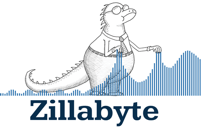Ex-Googler Jake Quist is debuting a new stealthy startup, called Zillabyte, that aims to disrupt the data analysis space. Quist explains that while he and his co-founder were engineers at Google, they were able to access a number of internal, extremely in-depth data analysis tools. But aside from being powerful, these tools were convenient for Quist and other Googlers to use and made it easy to analyze data and make better decisions.
As Quist tells me, When we left Google, we realized that data analysis outside the Googleplex kind of sucks. Big time. The tools available are so niche that only big enterprise can purchase them. The alternatives suck too.
Quist and his co-founder saw an opportunity to create an application that analyzes big-data but that doesn’t require a PhD to use. Basically, Zillabyte allows users to focus on their analysis and takes are of all the ugly technical details. The value proposition, says Quist, is convenience and ease of use without having to sacrifice functionality.
We’re told the application allows business users to create and run high-end analyses in the cloud. Zillabyte will remove the pain of acquiring and cleaning data, managing resources, and implementing difficult algorithms. Zillabyte builds upon known paradigms, such as spreadsheets, and automatically scales resources to run the analysis. For example, a business user can run a sentiment algorithm on Twitter, correlate it with the stock market, and visualize the resulting pattern. Users only pay for resources consumed. Power users can extend this functionality further with custom code and build entire “big-data” apps against the Zillabyte infrastructure.
Zillabyte will also come with ready-to-use datasets. One of those datasets is a crawled copy of the web. (Yes, the entire web). Users can gain insights such as: “how many sites use Facebook Connect?” or “how many sites are translated into Japanese?”. The user doesn’t need to know anything about Hadoop, and only pays for the resources used.
Additionally, Zillabyte will come with high-end algorithms, such as natural language processing (NLP) tools. For example, a user may use the crawled-web and NLP algorithms to extract all the locations associated with Barack Obama. She can then use this data to create an interactive visualization.
Of course, the underlying theme around all of these processes is that Zillabyte is easy to use for business users. Unfortunately, the startup, which is self-funded, is in private beta and will launch to the public in March of next year.
There’s no doubt that the big data, business intelligence space has huge potential. We’ll see soon if Zillabyte can be one of the disruptive startups in this market. Stay tuned.
